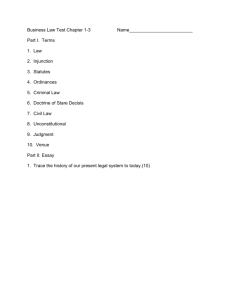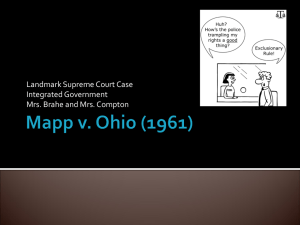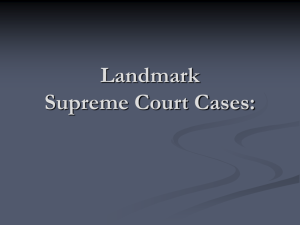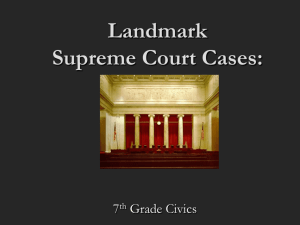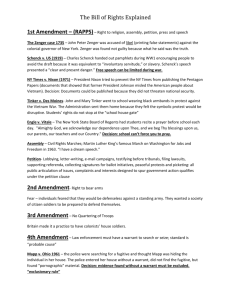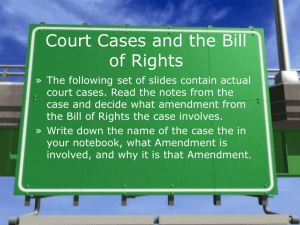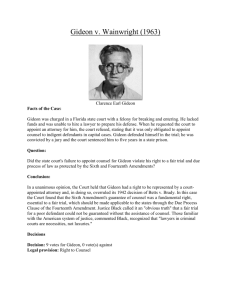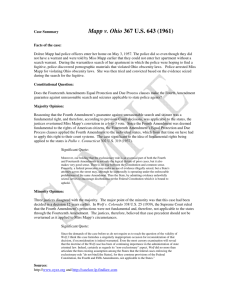Supreme Court Cases of the 1960s
advertisement
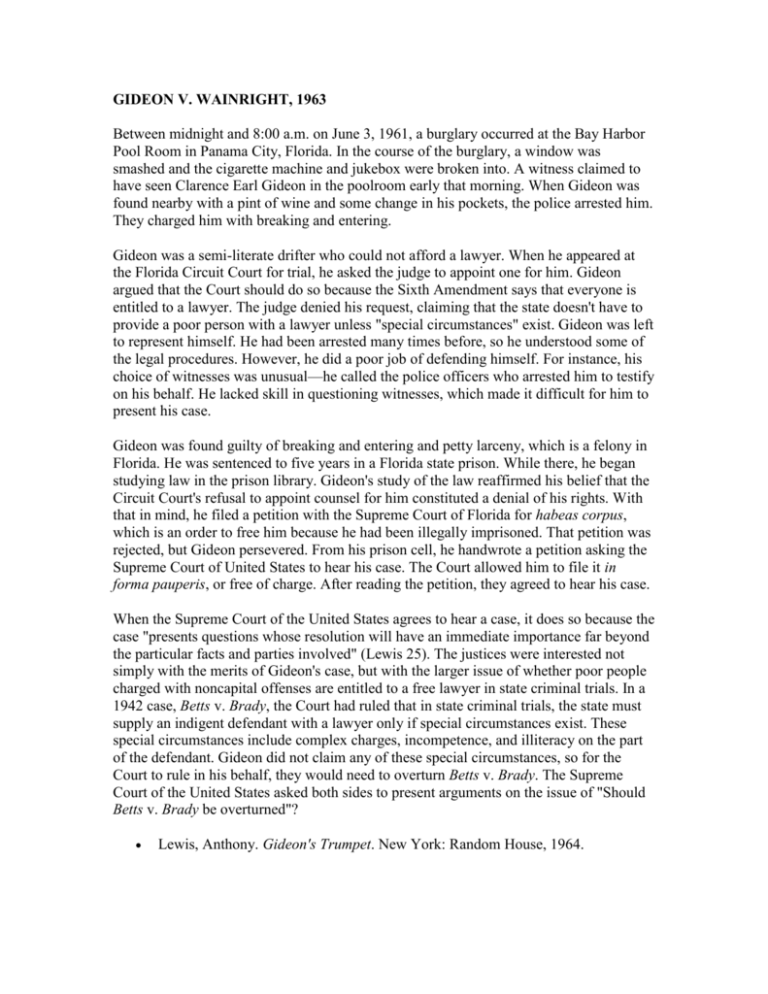
GIDEON V. WAINRIGHT, 1963 Between midnight and 8:00 a.m. on June 3, 1961, a burglary occurred at the Bay Harbor Pool Room in Panama City, Florida. In the course of the burglary, a window was smashed and the cigarette machine and jukebox were broken into. A witness claimed to have seen Clarence Earl Gideon in the poolroom early that morning. When Gideon was found nearby with a pint of wine and some change in his pockets, the police arrested him. They charged him with breaking and entering. Gideon was a semi-literate drifter who could not afford a lawyer. When he appeared at the Florida Circuit Court for trial, he asked the judge to appoint one for him. Gideon argued that the Court should do so because the Sixth Amendment says that everyone is entitled to a lawyer. The judge denied his request, claiming that the state doesn't have to provide a poor person with a lawyer unless "special circumstances" exist. Gideon was left to represent himself. He had been arrested many times before, so he understood some of the legal procedures. However, he did a poor job of defending himself. For instance, his choice of witnesses was unusual—he called the police officers who arrested him to testify on his behalf. He lacked skill in questioning witnesses, which made it difficult for him to present his case. Gideon was found guilty of breaking and entering and petty larceny, which is a felony in Florida. He was sentenced to five years in a Florida state prison. While there, he began studying law in the prison library. Gideon's study of the law reaffirmed his belief that the Circuit Court's refusal to appoint counsel for him constituted a denial of his rights. With that in mind, he filed a petition with the Supreme Court of Florida for habeas corpus, which is an order to free him because he had been illegally imprisoned. That petition was rejected, but Gideon persevered. From his prison cell, he handwrote a petition asking the Supreme Court of United States to hear his case. The Court allowed him to file it in forma pauperis, or free of charge. After reading the petition, they agreed to hear his case. When the Supreme Court of the United States agrees to hear a case, it does so because the case "presents questions whose resolution will have an immediate importance far beyond the particular facts and parties involved" (Lewis 25). The justices were interested not simply with the merits of Gideon's case, but with the larger issue of whether poor people charged with noncapital offenses are entitled to a free lawyer in state criminal trials. In a 1942 case, Betts v. Brady, the Court had ruled that in state criminal trials, the state must supply an indigent defendant with a lawyer only if special circumstances exist. These special circumstances include complex charges, incompetence, and illiteracy on the part of the defendant. Gideon did not claim any of these special circumstances, so for the Court to rule in his behalf, they would need to overturn Betts v. Brady. The Supreme Court of the United States asked both sides to present arguments on the issue of "Should Betts v. Brady be overturned"? Lewis, Anthony. Gideon's Trumpet. New York: Random House, 1964. Questions to Consider 1. What were the charges against Gideon? 2. Did Gideon seem to be capable of defending himself? Could a lawyer have helped him? If so, how? 3. What was unique about the petition that Gideon filed with the Supreme Court of the United States? 4. Why did the Supreme Court of the United States agree to hear Gideon's case? 5. In Betts v. Brady, the Court had said that in state courts, poor people are entitled to an attorney free of charge only if "special circumstances" existed. Gideon did not claim any "special circumstances." Do you think that states should be required to provide him and others like him with a lawyer? Why or why not? MIRANDA V. ARIZONA, 1966 Ernesto Miranda was a poor man living in Phoenix, Arizona in 1963. A Phoenix woman was kidnapped and raped. She identified Miranda in a police lineup. Miranda was arrested, charged with the crimes, and questioned by the police for two hours. The police officers questioning him did not inform him of his Fifth Amendment right against selfincrimination or of his Sixth Amendment right to the assistance of an attorney. The Fifth Amendment states that no person "shall be compelled in any criminal case to be a witness against himself. . . ." The Sixth Amendment states that, "In all criminal prosecutions, the accused shall enjoy the right . . . to have the assistance of counsel for his defense." As a result of the questioning, Miranda confessed in writing to the crimes. His statement also said that he was aware of his right against self-incrimination. During his trial, the prosecution used his confession to obtain a conviction, and he was sentenced to 20 to 30 years in prison on each count. Miranda appealed his case to the Arizona Supreme Court. His attorney argued that his confession should have been excluded from trial because he had not been informed of his rights, nor had an attorney been present during his interrogation. The police officers involved admitted that they had not given Miranda any explanation of his rights. The state argued, however, that because Miranda had been convicted of a crime in the past, he must have been aware of his rights. The Arizona Supreme Court denied Miranda's appeal and upheld his conviction. The case comes down to this fundamental question: What is the role of the police in protecting the rights of the accused, as guaranteed by the Fifth and Sixth Amendments to the Constitution? The Supreme Court of the United States had made previous attempts to deal with these issues. The Court had already ruled that the Fifth Amendment protected individuals from being forced to confess. They had also held that persons accused of serious crimes have a fundamental right to an attorney, even if they cannot afford one. In 1964, after Miranda's arrest, but before the Court heard his case, the Court ruled that when an accused person is denied the right to consult with his attorney, his or her Sixth Amendment right to the assistance of a lawyer is violated. But do the police have an obligation to ensure that the accused person is aware of these rights before they question that person? In 1965, the Supreme Court of the United States agreed to hear Miranda's case. At the same time, the Court agreed to hear three similar cases. The Court combined all the cases into one case. Since Miranda was listed first among the four cases considered by the Court, the decision came to be known by that name. The decision in Miranda v. Arizona was handed down in 1966. Questions to Consider 1. What rights of the accused does the Fifth Amendment protect? The Sixth Amendment? 2. If the police had informed Ernesto Miranda of these rights, do you think he might have done anything differently? 3. Individual rights must be balanced against the values of society at large. For instance, the right to free speech must be balanced against our desire for an orderly society. This is why demonstrations, while protected by the First Amendment, can have certain restrictions placed on them. In Miranda, what values or goals of society must be balanced against the right against selfincrimination and the right to counsel? 4. You are probably learning about the rights of the accused in a government or history class. Some would argue that it is the individual's responsibility to know what his or her rights are under the Constitution, and the government can assume that accused persons know their rights without informing them after they are arrested. Do you think the government should have to inform each individual who is arrested of his or her rights? Why or why not? MAPP V. OHIO, 1961 Suspicious that Dollree Mapp might be hiding a person suspected in a bombing, the police went to her home in Cleveland, Ohio. They knocked on her door and demanded entrance. On the advice of her lawyer, Mapp refused to let them in because they did not have a warrant. After observing her house for several hours and recruiting more officers to the scene, the police forced their way into Mapp's house. When Mapp confronted them and demanded to see their search warrant, one of the officers held up a piece of paper. He claimed it was the search warrant. Mapp grabbed the paper but an officer recovered it and handcuffed Mapp. The police dragged her upstairs and searched her bedroom. Finding nothing there they went to other rooms in the house, including the basement. As a result of their search of the basement, the police found a trunk containing pornographic books, pictures, and photographs. They arrested Mapp and charged her with violating an Ohio law against the possession of obscene materials. At the trial the police officers did not show Mapp and her attorney the alleged search warrant or explain why they refused to do so. Nevertheless, the court found Mapp guilty and sentenced her to jail. Mapp and her attorney appealed the case to the Supreme Court of Ohio. Mapp's attorney argued that because the police had no warrant, their search of her basement was illegal. Because the search was illegal, he said, the evidence gained from the search was also illegal. Illegal evidence should not have been allowed in Mapp's trial. In the ruling, the Court disagreed and said that because the evidence was taken peacefully from the trunk, rather than by force from Mapp, it was legal. As a result, Mapp's appeal was denied and her conviction upheld. Mapp then appealed her case to the Supreme Court of the United States. The case came down to this fundamental question: is evidence obtained through a search that violates the Fourth Amendment admissible in state courts? The Fourth Amendment states "The right of the people to be secure in their persons, houses, papers, and effects, against unreasonable searches and seizures, shall not be violated, and no warrants shall issue, but upon probable cause . . . and particularly describing the place to be searched, and the persons or things to be seized." The Fourth Amendment, however, does not define when a search or seizure becomes "unreasonable". It also does not explain how evidence obtained from an "unreasonable" search should be treated. Mapp's case was not the first case to ask this kind of question. In several rulings over the hundred years leading up to Mapp the Supreme Court of the United States had tried to answer questions about what, exactly, the Fourth Amendment means. They had agreed that neither federal nor state officials could conduct "unreasonable searches". Furthermore, in Weeks v. United States, they had determined that federal officials could not use evidence obtained in such searches at trial. However, they had not ruled on whether states could use illegally seized evidence to convict a criminal. Some states, including Ohio, felt that they should be able to make their own determination regarding this issue. Doing so would be consistent with historical tradition—states had always supervised the operation of their criminal justice systems. In 1960 the Supreme Court of the United States agreed to hear Mapp's case and determine whether the Fourth and Fourteenth Amendments, which said the Fourth Amendment applies to the states, prohibited state officials from using evidence obtained in an unreasonable search. The decision in Mapp v. Ohio was handed down in 1961. Questions to Consider 1. In your opinion, was Mapp right to not let the police enter her house? Explain your reasoning. 2. The Fourth Amendment states "The right of the people to be secure . . . against unreasonable searches and seizures shall not be violated. . . ." Pretend that you were a justice for the Supreme Court of Ohio. What, if anything, would you find unreasonable in the search of Mapp's house? Explain. 3. The Supreme Court of the United States has to balance the protection of the rights of individuals against the protection of society. If the police had not searched Mapp's house they would never have found the pornography. With this in mind, do you think the rights of Mapp or society should have been more important? Explain.
